2024 ‘Be the Change’ Youth Training Program
June 30 - July 2, 2024, Washington, DC
Week in Review
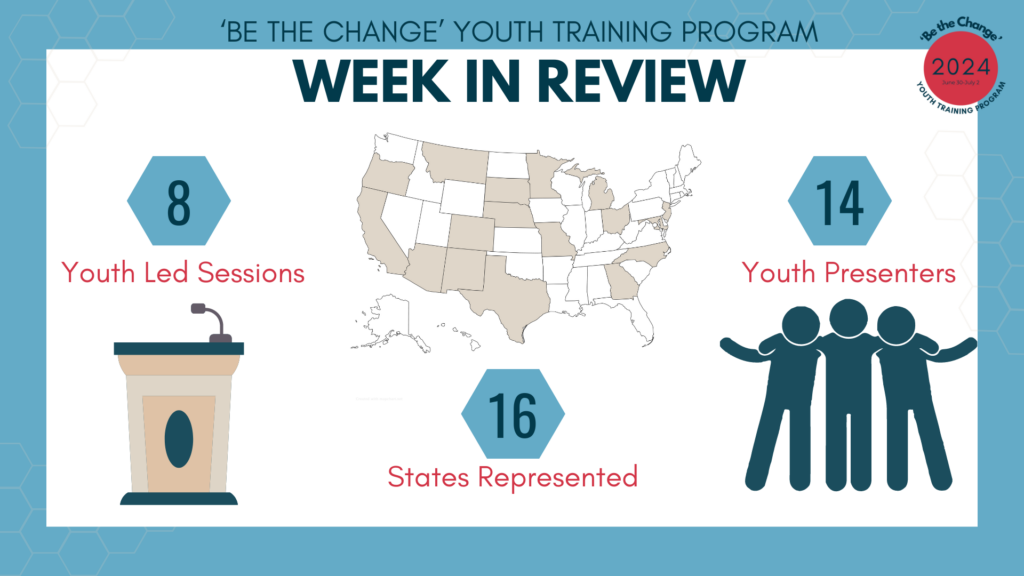
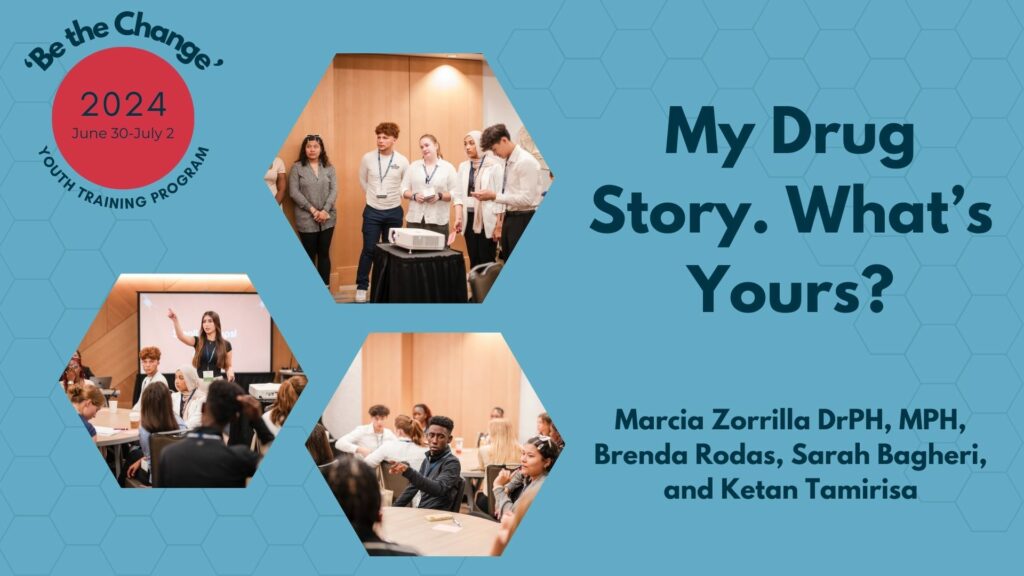
“My Drug Story. What’s Yours?” by Marcia Zorrilla DrPH, MPH, Brenda Rodas, Sarah Bagheri, and Ketan Tamirisa
Everyone has a story to share about substance use and how it impacts people, especially youth. The Stanford REACH Lab Youth Action Board (YAB) shared their stories and invited the youth audience to share as well. In small groups, the audience used Forum Theatre techniques and act out skits based on shared stories and to create the change they want to see. Created by Augusto Boal, Forum Theatre is a participatory form of theatre that engages the audience in examining the oppressions seen and discussing the possibilities of “rehearsing” options to change the outcome of the theatre piece. Forum theatre is perfect for those curious to “try out” ideas, start a dialogue, and create change in a fun and interactive way.
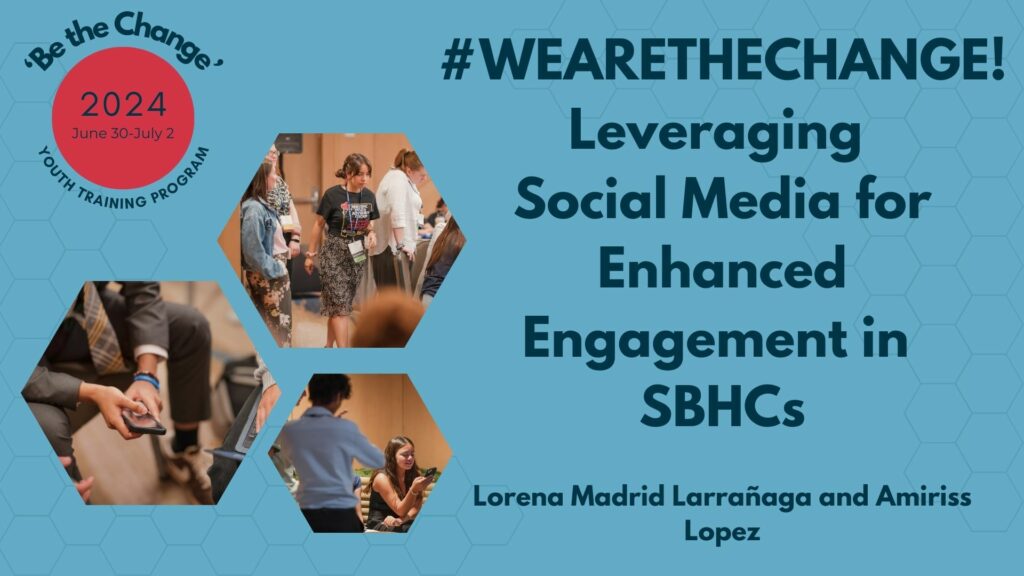
“WEARETHECHANGE! Leveraging Social Media for Enhanced Engagement in SBHCs” by Lorena Madrid Larrañaga and Amiriss Lopez
During the 2023 New Mexico legislative session, student advocates from the NMASBHC Youth Advocacy Group (YAG) and Albuquerque High School’s Peer Health Educators Club, PAUSE, promoted Senate Bill 397, aimed at creating and operating SBHCs in New Mexico. YAG students attended public health day at the legislature and wrote letters to their representatives requesting support for this bill. They also propagated SB397 through social media to solicit support from their followers who then contacted their representatives. By utilizing social media as a medium of outreach, the YAG was able to broaden awareness of SB397 and similar bills, ultimately resulting in the bills being signed. YAG students were active in this process by testifying for bills during committees and publicly voicing their support through social media. Ultimately, social media was effective in educating and engaging the masses in legislative action which contributed to the implementation of new laws promoting the health and wellness of New Mexicans.
In this presentation, NMASBHC youth representatives shared the collaborative outreach efforts that were employed in their campaign and their positive effects. Presenters shared lessons learned and discuss elements of social media campaign planning, ie, hashtags, different social media platforms, working collaboratively with the school, SBHC, and community partners and identify ways to connect with the intended audience. Participants combined previous and gained social media knowledge to engage in an interactive group activity and create their multi-media content to share with others and get feedback on how to improve their content.
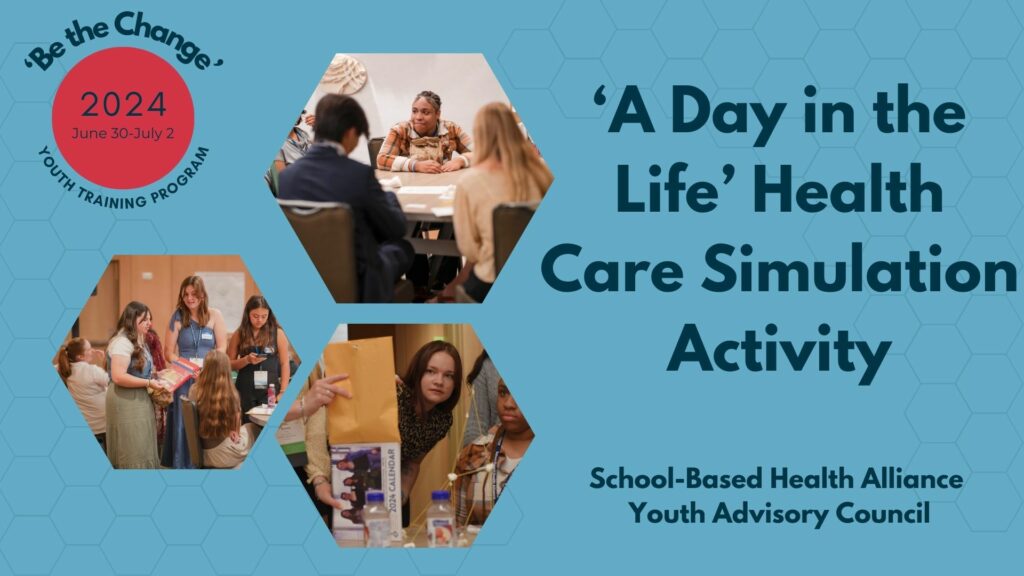
‘A Day in the Life’ Health Care Simulation Activity
What is life without a school-based health center (SBHC)? Presenters educated youth about the components of the current health service systems available to people nationwide. Through role-play and interaction, young people better understand the value and benefits of SBHCs, as well as learn language they can use to advocate for peers to obtain the health services they need in a non-SBHC setting.
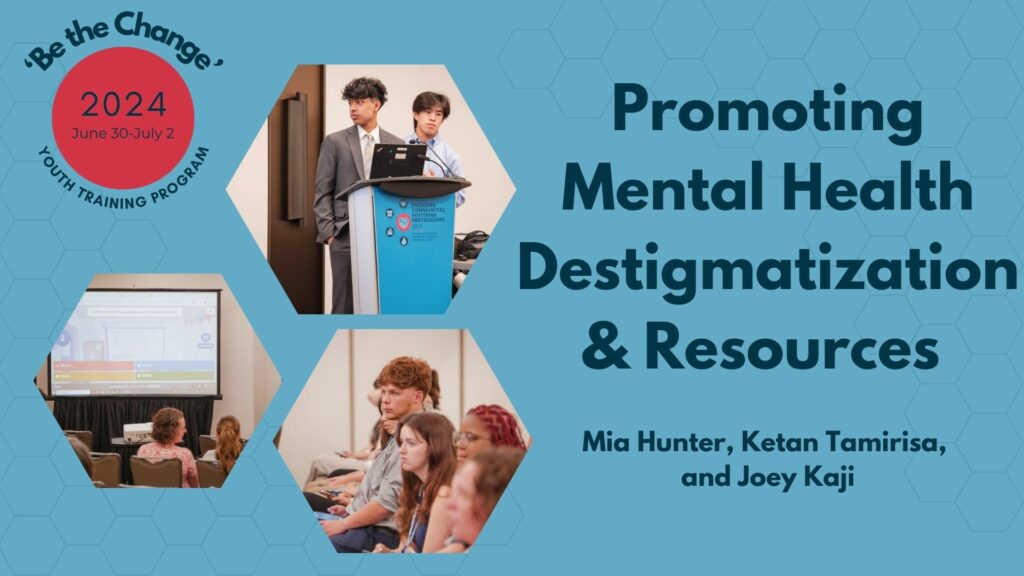
“Promoting Mental Health Destigmatization & Resources” by Mia Hunter, Ketan Tamirisa, and Joey Kaji
This workshop explored strategies related to destigmatizing mental health and teach participants how to promote mental health resources (facilitating support groups, putting up posters, working with their school/local government officials) in their communities and SBHCs. According to the U.S. Department of Health & Human Services, the United States faces a large-scale youth mental health crisis with 49.5% of adolescents grappling with a mental health disorder at some point during their life. School-based health centers (SBHCs) play a crucial role in providing mental health care for youth, especially in communities with limited external resources for students. Presenters facilitated insightful conversations about mental health perspectives and reflect on personal experiences. Individuals’ culture can play a role in stigmatization surrounding mental health. Presenters encouraged discussion surrounding the negative impacts of culture on mental health and how that can be reversed. They had students engage in activities (i.e. running a mock support group) that will help students promote mental health resources (including support groups/seminars, awareness posters, etc.) in their communities. Through various other interactive activities and discussions, participants learned the importance of elevating mental health awareness, promoting mental health resources, and working to create a destigmatized mental health culture. Participants will be able to bring back (to their communities and SBHCs) newfound skills in facilitating support groups/educational seminars, designing posters and spreading awareness through social media, and working with adults to promote mental health.
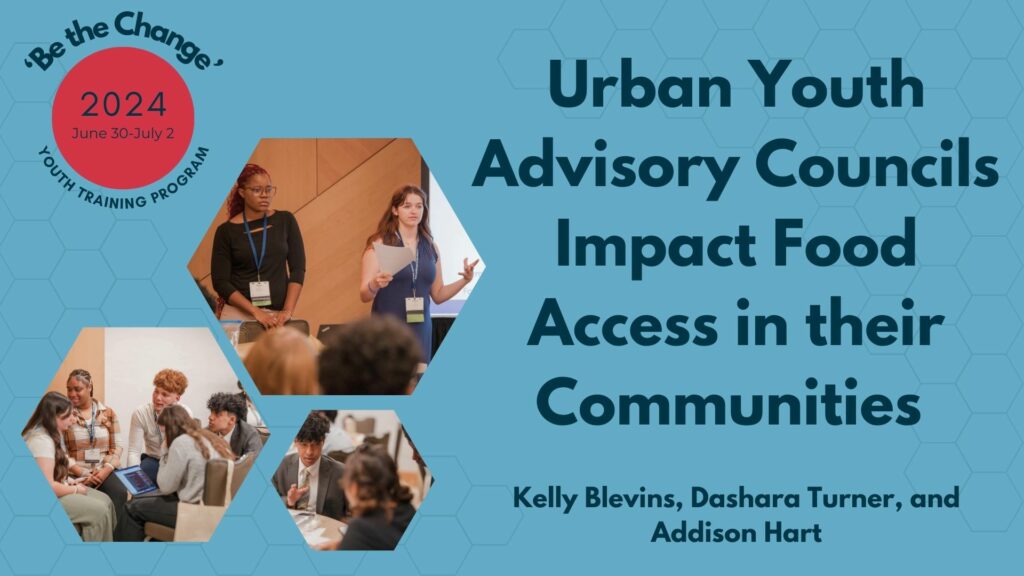
“Urban Youth Advisory Councils Impact Food Access in their Communities” by Kelly Blevins, Dashara Turner, and Addison Hart
The MetroHealth School Health Program, a hybrid mobile and school clinic-based school health provider in Cleveland, Ohio, established three Youth Advisory Councils (YACs) at local high schools for the 2023-24 school year. Schools were chosen to represent diverse student populations across the city. The goals of the YACs were to provide feedback on School Health Program services, promote MetroHealth services to students, and create youth-led food access projects to impact food security in their school or community (to be completed in Spring 2024). Members of the YACs will share their experiences, including the impact YAC participation had on them, the changes MetroHealth is planning to make because of YAC feedback, and the results of the food access projects. Youth presenters shared measurable outcomes, success stories, and personal accounts of their experiences with the YAC.
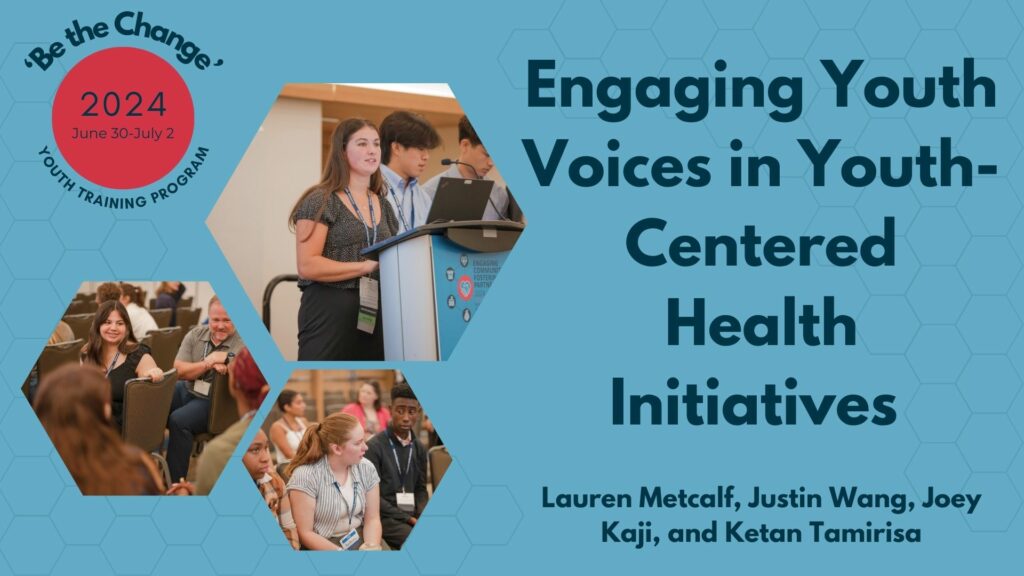
“Engaging Youth Voices in Youth-Centered Health Initiatives” by Lauren Metcalf, Justin Wang, Joey Kaji, and Ketan Tamirisa
In our increasingly divisive society, there exist a multitude of issues—from inadequate social support structures to a pervasive lack of early intervention efforts—that disproportionately affect the wellbeing of marginalized and underserved populations. Reform is critical, and it is needed urgently. From civic engagement to interacting with stakeholders, advocacy is a powerful tool for change, paving the way for a more equitable future. However, when talking about issues that concern youth, youth voices are often dismissed. Thus, it’s essential to emphasize the importance of advocacy within youth-oriented spaces, as this process allows students to connect with people in positions of power. This workshop helped youth gain the skills to engage in conversations in which their voices would otherwise go unheard. Advocacy plays an important role in school-based health care. From obtaining funding for SBHCs to promoting early intervention healthcare for marginalized populations, advocacy—especially from a youth-centered front—plays an essential role in ensuring successful school-based health.
Youth Poster Highlight
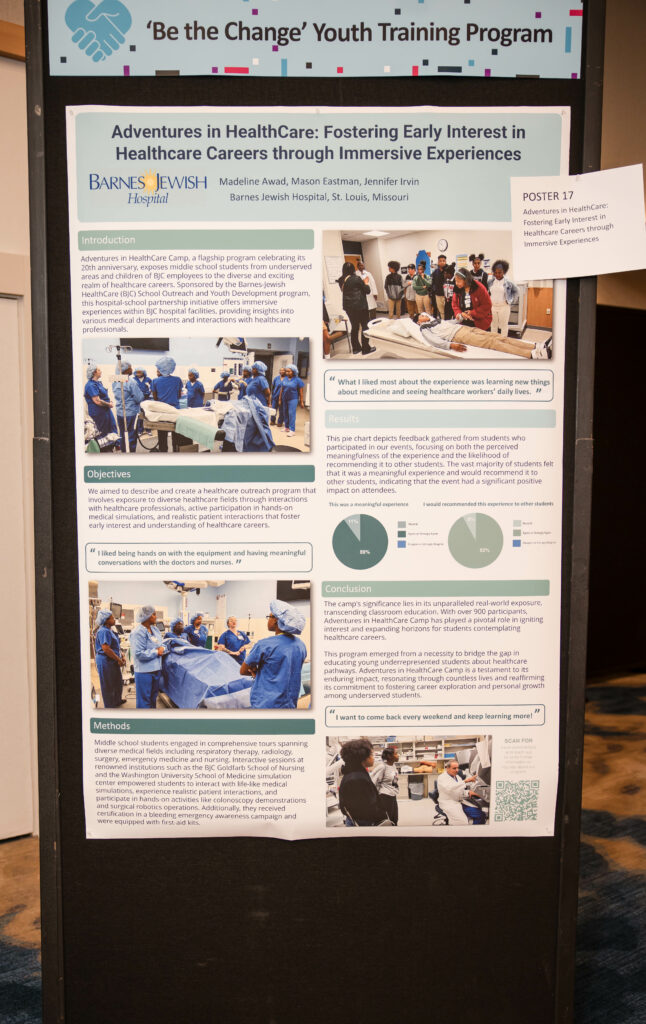
“Adventures in HealthCare: Fostering Early Interest in Healthcare Careers through Immersive Experiences” by Madeline Awad and Mason Eastman
Adventures in HealthCare Camp, a flagship program celebrating its 20th anniversary, exposes middle school students from underserved areas to the diverse and exciting realm of healthcare careers. Sponsored by the Barnes-Jewish HealthCare (BJC) School Outreach and Youth Development program, this hospital-school partnership initiative offers immersive experiences within BJC hospital facilities, providing insights into various medical departments and interactions with healthcare professionals.
Middle school students engaged in comprehensive tours spanning diverse medical fields including respiratory therapy, radiology, surgery, emergency medicine, cardiology, and nursing. Interactive sessions at renowned institutions such as the BJC Goldfarb School of Nursing and the Washington University School of Medicine simulation center empowered students to interact with lifelike medical simulations, experience realistic patient interactions, and participate in hands-on activities like colonoscopy demonstrations and surgical robotics operations. Additionally, they received certification in a bleeding emergency awareness campaign and were equipped with first-aid kits.
The camp’s significance lies in its unparalleled real-world exposure, transcending classroom education. With over 900 participants, Adventures in HealthCare Camp has played a pivotal role in igniting interest and expanding horizons for students contemplating healthcare careers.
This program emerged from a necessity to bridge the gap in educating young underrepresented students about healthcare pathways. Adventures in HealthCare Camp is a testament to its enduring impact, resonating through countless lives and reaffirming its commitment to fostering career exploration and personal growth among underserved students.
